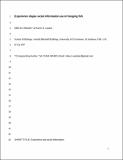Files in this item
Experience shapes social information use in foraging fish
Item metadata
| dc.contributor.author | Webster, Michael Munro | |
| dc.contributor.author | Laland, Kevin Neville | |
| dc.date.accessioned | 2019-11-15T00:36:41Z | |
| dc.date.available | 2019-11-15T00:36:41Z | |
| dc.date.issued | 2018-12 | |
| dc.identifier | 256579338 | |
| dc.identifier | 1b8b8222-aa3e-4959-9da8-9ee2be851826 | |
| dc.identifier | 85056458197 | |
| dc.identifier | 000452589500007 | |
| dc.identifier.citation | Webster , M M & Laland , K N 2018 , ' Experience shapes social information use in foraging fish ' , Animal Behaviour , vol. 146 , pp. 63-70 . https://doi.org/10.1016/j.anbehav.2018.10.005 | en |
| dc.identifier.issn | 0003-3472 | |
| dc.identifier.other | ORCID: /0000-0001-9597-6871/work/60427819 | |
| dc.identifier.other | ORCID: /0000-0002-2457-0900/work/60630416 | |
| dc.identifier.uri | https://hdl.handle.net/10023/18928 | |
| dc.description | Funding: This work was funded by the Natural Environment Research Council (NE/D010365/1) to K.N.L. | en |
| dc.description.abstract | Many species of animal use social information, and in a variety of different contexts, but it is not clear to what degree their ability to do this depends upon their prior experience of the association between the behaviour of others and reward. We addressed this question in an experiment in which two stickleback species (Gasterosteus aculeatus and Pungitius pungitius) were exposed to a novel feeding task and then tested under a range of conditions. Using a fully-factorial training design, fish were either fed from the surface or the bottom of their tank, and at the same time were exposed to conspecifics feeding from the surface or bottom. At test, we showed that in order to be able to use demonstrator behaviour to anticipate the presence of food at the surface, test subjects needed first to have prior experience of both: sticklebacks responded to the behaviour of conspecifics that were feeding at the surface by rising higher in the water column themselves, but, crucially, they only did this if they had prior experience both of finding food at the water surface and of seeing others feed there. Moreover, they only displayed this response in the presence of feeding conspecifics, but not when the demonstrators were not feeding or were absent. The role of prior experience and learning in social information use is surprisingly understudied. We suggest that such work is vital if we are to understand the level at which natural selection operates in shaping social information use and social learning. | |
| dc.format.extent | 413948 | |
| dc.language.iso | eng | |
| dc.relation.ispartof | Animal Behaviour | en |
| dc.subject | Producer-scrounger | en |
| dc.subject | Public information | en |
| dc.subject | Social information | en |
| dc.subject | Social learning | en |
| dc.subject | Social transmission | en |
| dc.subject | QH301 Biology | en |
| dc.subject | SH Aquaculture. Fisheries. Angling | en |
| dc.subject | NDAS | en |
| dc.subject.lcc | QH301 | en |
| dc.subject.lcc | SH | en |
| dc.title | Experience shapes social information use in foraging fish | en |
| dc.type | Journal article | en |
| dc.contributor.sponsor | NERC | en |
| dc.contributor.institution | University of St Andrews. School of Biology | en |
| dc.contributor.institution | University of St Andrews. Centre for Biological Diversity | en |
| dc.contributor.institution | University of St Andrews. Centre for Social Learning & Cognitive Evolution | en |
| dc.contributor.institution | University of St Andrews. Scottish Oceans Institute | en |
| dc.contributor.institution | University of St Andrews. Institute of Behavioural and Neural Sciences | en |
| dc.identifier.doi | 10.1016/j.anbehav.2018.10.005 | |
| dc.description.status | Peer reviewed | en |
| dc.date.embargoedUntil | 2019-11-15 | |
| dc.identifier.grantnumber | NE/D010365/1 | en |
This item appears in the following Collection(s)
Items in the St Andrews Research Repository are protected by copyright, with all rights reserved, unless otherwise indicated.

